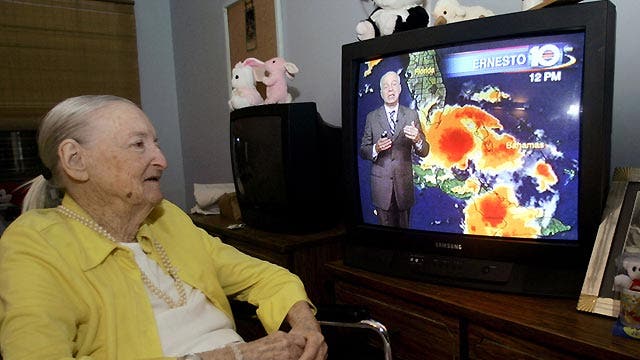Government trying to control what you see on the news?
'Special Report' All-Star panel weighs in
This is a rush transcript from "Special Report," February 20, 2014. This copy may not be in its final form and may be updated.
(BEGIN VIDEO CLIP)
JOHN WATSON, AMERICAN UNIVERSITY: Whenever I hear of the government going into a news room to do something other than deliver coffee, I become frightened, because the government should not, as a general rule, be any part of journalism.
ROBERT MCDOWELL, FORMER FCC COMMISSIONER: So the big question is what's the quid pro quo? How much government coercion might there be with all of this? Is the government trying to ultimately dictate speech and dictate how journalists are supposed to do their jobs? And it doesn't matter what your political stripe is, that's just not a good idea, especially when you have such a competitive communications landscape.
(END VIDEO CLIP)
BRET BAIER, ANCHOR: Well, it's all about a research project for the FCC. This is how to quote goes that raised a lot of eyebrows here in Washington "to ascertain the process by which stories are selected, station priorities, for content, production quality, and populated served, perceived station bias, perceived percent of news dedicated to each of the eight CINs, critical information needs, and perceived responsiveness to underserved populations."
The FCC chairman responded to all the criticism that has been launched in the past day or so. "The commission has no intention of regulating political or other speech of journalists or broadcasters by way of this research design, any resulting study, or through any other means. The research design is a precursor to any formal study. If used in any way, it's goal would be similar to those of past reports seeking to identify whether potential market barriers exist, and if so, whether those barriers affect diversity of media and voices."
OK, back with the panel. Charles, interpretation?
CHARLES KRAUTHAMMER, SYNDICATED COLUMNIST: If government were to bring any coffee to Fox, I would get a taster before I would touch it.
Look, this is as if the IRS and the EPA and the NLRB haven't done enough damage, the FCC now has to trample on what rights are remaining. This is an outrage disguised as a study. The FCC regulates the media. And it has the power to remove your license, meaning to ruin you overnight. So any question it asks is never innocent.
And what is it asking about critical information needs? Who decides what's a critical information need? Critical information needs is a concept you have in Kiev or in Moscow. You don't have it in the United States. Everybody decides on his own. The idea that we don't have enough diversity in the media in the United States -- there are more media today than in the history of mankind, including cave drawings. This is absolutely an outrage. What the House of Representatives ought to do tomorrow is to pass a law withholding up every penny from every such study now or evermore.
BAIER: Nina?
NINA EASTON, COLUMNIST, FORTUNE MAGAZINE: I need to correct Charles. It's actually CIN, critical information needs, if you read the full report, which is full of acronyms just like this. This would be funny if it wasn't scary. They are literally going to train government bureaucrats to come in and talk to news professionals about how they do their jobs. Sound familiar, ObamaCare? They are going to ask things like, what is your news philosophy? They are even going to be trained not to show too much alarm or emotion when interviewing the Fox News team.
BAIER: You don't buy Commissioner Wheeler? You don't buy the statement or the walk-back?
EASTON: I think it's outrageous. I'm outraged that taxpayers are funding for this. If this is a university study and they want to come in and look at this – but no. It's scary. As Charles said, they wield tremendous power, the FCC, over licensing. Just by virtue of being there, the chilling effect of what they are doing, what do they know about deciding what's news and what's not news?
BAIER: Chuck?
CHARLES LANE, EDITORIAL WRITER, WASHINGTON POST: Well, just for variety sake, I'm going to go with funny instead of scary, because I read through the research design. I have read through the documents related to this. And this study is less threatening than it is unintelligible. I cannot understand after reading this research program what the heck it is they are going to accomplish.
By the way, the contractor that they've hired to do this has absolutely no experience in this area. In fact, their website says that this organization focuses on four priority areas, substance abuse and mental health, international public health, sexual and reproductive health, and gender and special populations health. This is the group getting -- I don't know how many dollars -- contract to go out and explore news rooms. The National Association of Broadcasters filed a brief in this case, tried to warn the FCC off, and they said they are concerned that the diffused, multifaceted focus of the research has the potential to undermine its usefulness for any particular purpose. I would say that's the real danger here.
KRAUTHAMMER: Incompetence and incoherence don't get you off the hook. This is not funny.
BAIER: OK, that's it for the panel. Stay tuned for some awkward media coverage in Sochi.
Content and Programming Copyright 2014 Fox News Network, LLC. ALL RIGHTS RESERVED. Copyright 2014 CQ-Roll Call, Inc. All materials herein are protected by United States copyright law and may not be reproduced, distributed, transmitted, displayed, published or broadcast without the prior written permission of CQ-Roll Call. You may not alter or remove any trademark, copyright or other notice from copies of the content.






















